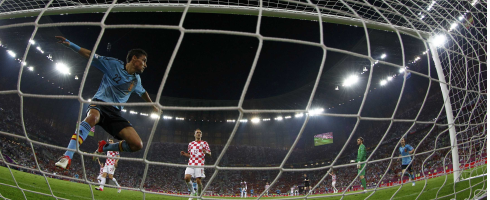Spain made it through to the last eight of Euro 2012 with a hard-fought 1-0 victory over Croatia in Gdansk on Monday. Yet, progression as Group C winners has not disguised the fact that Vicente Del Bosque’s men have been relatively unconvincing so far and at one stage against the Croats were in danger of going out of the tournament.
Although touted quite rightly as the world’s best team, the Spanish have clearly shown they are not as strong as the side that won the competition in 2008 and the 2010 World Cup, so what has happened in the meantime?
Striker-less
Most markedly, they do not appear to possess a striker around which their attacks can be based, despite Fernando Torres’ brace against what proved to be a woefully inept Irish side. Having started the opener against Italy without a recognised frontman, with the likes of Torres, Fernando Llorente and Alvaro Negredo warming the bench, Del Bosque appeared to show the Italians excessive respect and instead relied on Cesc Fabregas’ marauding midfield runs to break down the Azzurri resistance.
With players of the calibre of Fabregas, David Silva, Xavi Hernandez and Andres Iniesta in midfield, a case could be made for whether they actually need a main striker, yet has Del Bosque has been overly seduced by Barcelona’s all-conquering tiki-taka football?
Defensive doubts
While not subjected to a great amount of pressure in the group stages, when questions have been asked of the defence, it has looked far from comfortable. Jordi Alba’s emergence as first-choice left-back has been a plus, while Sergio Ramos has moved seamlessly into central defence in place of the injured Carles Puyol. But Alvaro Arbeloa’s inclusion – he is still uncertain of his place in the Real Madrid starting line-up for next season – and Gerard Pique’s indifferent form for Barcelona last term, when he looked pedestrian at times – has left many wondering if they still merit a place in the side. It remains to be seen how they will cope if they come up against countries of the calibre of Germany and France.
Midfield fatigue
Xavi Hernandez is the man who pulls the strings in midfield and dictates the tempo of the game and the way Spain play, yet towards the end of the 2011-12 La Liga season the 32-year-old was showing signs of tiredness. No surprise, as he has hardly had a break since before the last European Championships four years ago and has since struggled with calf and achilles injuries – his playing time will need to be carefully managed if he is to have the impact La Roja expect.
Ambitious opponents
Croatia boss Slaven Bilic revealed he had a plan to neutralise the Spain midfield and take the attack to them in the final 20 minutes – to a large extent it worked – and although other nations have tried to do the same thing in the past, and failed spectacularly, the same tactic may now be looked upon as the way to go against today’s Spanish team. After all, it worked for Chelsea in the Champions League semi-final against Barcelona’s nucleus of Spain midfielders.
Internal sentiment
Arguments between Real Madrid and Barcelona are nothing new, yet since Spain’s last Euro triumph a succession of El Clasicos has thrown up a series of disagreements between the teams. Indeed, last year it was left to Madrid’s Iker Casillas and Barca’s Xavi to publicly cool things between international players at both clubs – in Casillas’ case to the detriment of his relationship with club boss Jose Mourinho – and even Del Bosque has attempted to paper over the cracks that have appeared. Outwardly all is calm, yet the rivalry that exists may still be an underlying factor with many old scores still to be settled at club level.
While Spain may remain favourites to win Euro 2012, no team has ever won three major international tournaments in a row and, in spite of any newly-perceived weaknesses in their make-up, they are still the team the others need to beat.

